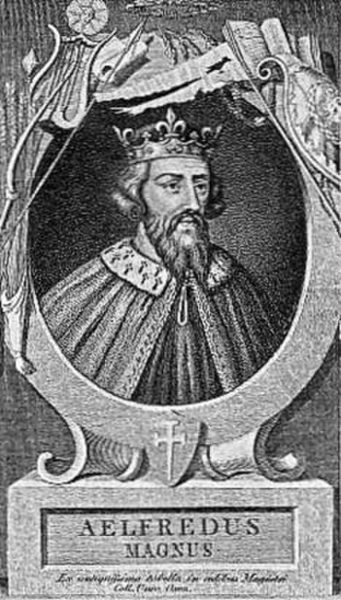
King Alfred, or Alfred the Great as he is otherwise known, is known as the Anglo-Saxon king who united all of England into one kingdom. We know more about him than most of the kings who came before, because we can read his own words. Unlike many of his predecessors, he was an intellectual king who valued learning and writing. His deeds were also recorded in the Anglo-Saxon Chronicles, written by monks in the medieval period of England, as well as by his personal biographer, a monk named Asser. But what made King Alfred so ”Great?” What did he do to set him apart from the majority of other kings?
The idea of a unified England was not a new one. King Offa of Mercia, who reigned between 757 and 769 CE, managed to control it as such for a short time, but his goal had never been for unity. He just wanted to rule over everything he could. Therefore, the lands he snagged control over fell apart shortly after his death, with no true allegiances holding them together. Alfred became King of Wessex in 871, at a time when England was once again divided into a series of smaller kingdoms. During the beginning of his reign, the Danes were invading England, taking over kingdom after kingdom and, according to contemporary sources, terrorizing the land. When the Danes came to Wessex, they managed to make Alfred flee and take refuge. Alfred took his time in refuge to get a plan together to retake Wessex, but he needed many men to do so. This is where his style of rule, different from many other kings, proved itself beneficial. Alfred ran his kingdom in such a way that it was like a partnership between the king and the people. This included having trials by juries of peers and government by local officials. The people felt they participated in the rule of their kingdom, which made them invested in what happened. Therefore, when Alfred rallied them to come and fight against the Danes to take back Wessex, the people responded and came to his aid. There was a fierce battle, and Alfred came out victorious. Afterward, his victory, which had occurred at the time of Easter, was compared to the resurrection of Christ and it established him as a great war leader.

Alfred didn’t rest after the main force of the Danes returned to the continent, but worked hard to fortify his kingdom against further attacks. He created a navy to fight the Danes at sea, and he reorganized the army so they could respond faster to attacks no matter where they happened. He built a line of fortresses around his kingdom to protect against attack as well. Over time, these fortresses became burghs, fortified towns that were self-governed under royal patronage. They became important centers for trade and commerce.
Alfred managed to recapture London from the Danes for England, and refortified it as well. This made him King of the West Saxons. In a treaty with the Danes, he refers to himself as King of the Angles and the Saxons.
Not only did Alfred strengthen England with the defeat of the Danes, but he took great steps to unify his people into one country. A large part of this was writing documents in the Anglo-Saxon vernacular language spoken by regular people of the country, rather than in Latin. He wanted things to be in a language people could understand, learn, and communicate in. He founded schools for common people and sponsored the translations of many Latin texts, as well as translating some himself.

In these ways, Alfred the Great, according to many sources, created a sense of nation in England in three ways: politically, linguistically, and culturally. Within two generations, England expanded as a nation up through Wales and Scotland, and was truly a unified nation. Yet not all of the tales and feats recorded about Alfred are necessarily true (see the tale of Alfred and the Cakes). While the events I discuss in this article have a strong(er) basis in fact, there are other things, like Alfred founding Oxford, or several of the moral tales told to children about his virtuous life, that may be a stretch. Particularly in the 19th century, when there was a strong imperial and nationalistic turn in Britain, legends cropped up about historical figures that were more legend than fact. King Alfred was not even called “the Great” until around the 16th century. This is why it’s important to look at when tales about people were first told, what their origins were, before we take them at face value, no matter what country’s history we are talking about. Stories are fun, but knowing and acknowledging the truth about our countries, even the ugly parts, is far more valuable.
Click through to read all of “What Made King Alfred so “Great?”” at GeekMom.If you value content from GeekMom, please support us via Patreon or use this link to shop at Amazon. Thanks!



